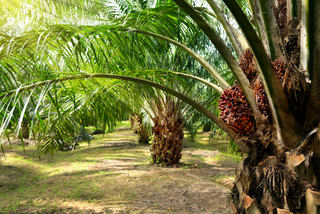 ations play an important role at Viori. They represent our commitment to being a sustainable, all-natural beauty company. And that's why we're excited to announce our most recent certification from the Roundtable of Sustainable Palm Oil (RSPO).
ations play an important role at Viori. They represent our commitment to being a sustainable, all-natural beauty company. And that's why we're excited to announce our most recent certification from the Roundtable of Sustainable Palm Oil (RSPO).
RSPO helps minimize the negative impact of palm oil cultivation on both the environment and the communities where palm oil is grown.
The non-profit works with stakeholders from all seven sectors of the palm oil industry to develop the environmental and social standards required for sustainable palm certification.
More than 5,000 members worldwide have joined the organization, each committed to producing, sourcing, and/or using sustainable palm oil certified by the RSPO exclusively. And Viori is proud to be one of those members.
Did You Know?
Palm oil is in a lot of products-- it is one of the most widely used raw ingredients on the planet. It's in a wide range of products like chocolate, cereal, ice cream, margarine, soap, cosmetics, and fuel for cars and power plants-- just to name a few.
Here's just a handful of common products that contain palm oil:

Why Do So Many Companies Use Palm Oil?
The reason palm oil is so popular is because of its unique properties:

But There Are Big Problems with Palm Oil…
The wide application of palm oil combined with increased global demand for it have resulted in the demand for palm oil to have skyrocketed over the last 30 years.
While this has led to massive reduction in poverty for the people working in the palm oil industry, the uncontrolled expansion of palm oil plantations has also brought many negative consequences:
Some of the devastating impacts have been:
To make matters worse, these problems are all concentrated in the tropical wetlands found in Asia (mainly in Indonesia and Malaysia), Central and South America, and Central and West Africa. Yet, it is exactly in these places where the Earth's biodiversity is most unique and where our much-needed rain forests still exist.

You might have come across disturbing pictures, as shown below, of deforestation projects and their harmful effect on the natural habitat. Unfortunately, these are often linked to unregulated palm oil plantation projects in Malaysia and Indonesia.



So, Why isn't Palm Oil Simply Banned or Heavily Regulated?
This exposes the complexity of the situation. There are two reasons why such a ban might backfire:
- Palm oil is much LESS harmful to the environment than alternatives such as rapeseed oil, sunflower oil, and soy oil. As we mentioned above, its yield per acre is much higher (often at least five times higher) than these alternatives. Therefore, banning palm oil would create a situation where even more land is transformed into plantations at the cost of the Earth's natural habitat.
- Banning palm oil in some markets might cause an increase in demand for palm oil in the countries/industries which place less importance on sustainability.
What can be done?
The Solution: Creating a palm oil standard that brings together all stakeholders and makes sustainability the industry norm.
This is where the Roundtable for Sustainable Palm Oil (RSPO) comes in.

About RSPO:
"Established in 2004, RSPO is a non-for-profit organisation that unites stakeholders from key sectors of the palm oil industry to promote the growth and use of sustainable palm oil through credible global standards.
Our founding members include the World Wide Fund for Nature (WWF), Malaysian Palm OIl Association (MPOA), Unilever, Migros, and AAK. Headquartered in Kuala Lumpur, Malaysia, RSPO also has representative offices in Indonesia, the United Kingdom, the United States, the Netherlands, China and Colombia. "Facts & Figures:

Source: www.rspo.com
How is Viori Doing its Part?
Sustainable Purchasing
Ever since we became aware of the harmful effects of non-sustainable palm oil, we switched all our palm oil purchases to ensure 100% of our suppliers were RSPO certified. Certified suppliers often come with a price tag, though: in general, RSPO palm oil is 8–15% more expensive than non-certified palm oil. However, this premium is more than worth it when considering the adverse effects of non-RSPO palm oil.
Certification + Commitment
Besides purchasing RSPO-certified palm oil, Viori has become an officially certified RSPO supply chain member. The certification process required an audit of our production facility and adopting an ongoing set of rules and guidelines throughout the company in handling everything related to palm oil.
These include:
- Training on-site staff on RSPO procedures
- Creating a Viori RSPO Manual
- Being fully transparent about our palm oil purchases by uploading these into the RSPO online system
- Conducting yearly on-site third party auditing
- Following RSPO Marketing and Communications guidelines
- Writing an annual 'Progress Report' on our current status and how we can help make the palm oil industry more sustainable

It's true Viori is only a minor player in the palm oil industry, but every action towards sustainability counts. And we believe the extra efforts and costs related to (ongoing) RSPO certification are well worth it.
At Viori, we see this certification as an essential step in preserving the environment and creating a more responsible and ethical supply chain. We thank our customers for their ongoing support and want to remind you that by purchasing Viori, you are directly supporting initiatives like this!
Responsible consumption can change industry standards. So, next time you're in the supermarket or shopping online, keep an eye out for products with the RSPO trademark!
Sources:
www.rspo.com
www.wwf.org
Do you have any questions about our Corporate Social Responsibility? Be sure to contact us at socialresponsibility@viori.com We're happy to answer any of your questions!

